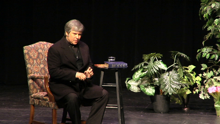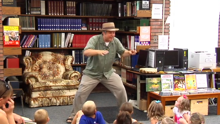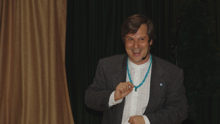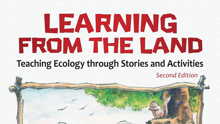The Art of Storytelling and Interpretation
Geared towards museum docents, teachers, and park naturalists, this two-hour intensive workshop begins with basic theatre games and improvisation to warm up our skills and instill within us the idea that we already know how to tell a tale or two. We will then explore ‘tales along the trail’ interpretive telling and the process of translating text to performance material, highlighting the idea that this is an engaging dialogue, a conversation with the art and audience. In the second hour we will tour the exhibit with stories and immerse ourselves in the format for creating memorable programs with storytelling as the foundation of all great interpretation. Though we will focus on the current exhibit, the skills learned can be used to interpret any future exhibit.
His-story and Her-story, too! Storytelling as a Tool in Historical Interpretation
Learn to tell historical stories and collect family stories. Learn how to write good questions, prepare for and conduct oral history interviews to research local history, with an emphasis on people often left out of the history books. Learn library research skills and how to read between the lines. Learn how to turn "field notes" into dynamic literature. And learn to perform, share, or otherwise publish this work.
On Beyond Genealogy
Once you have done the research, collected family bibles and obituaries, and surfed Ancestry.com, the question arises: How do we translate this list of names and dates into tell-able tales? This workshop will walk you through the steps of telling and writing stories to keep our ancestors’ memories alive. We all have a story to tell. We will help you find ways to pass on this deep sense of who we are and where we come from. These stories can become the foundation for a book that is a legacy for generations to come. Fox will also present lessons on narrative and poetic writing styles to bring family lore to print, and a primer on what you need to know to self-publish your family history. Please bring paper, pencil, 5 of your favorite family photographs, and a family tree if you have one. Come to listen and come to tell!
Stepping Into Character: Presenting First Person Interpretations
The stories of real people allow you to travel to distant times and places. Meet important characters from the worlds of science, literature and history, step into their shoes and learn to embody their story. The goal of this workshop is to help you bring to life the characters you connect with and tell their stories in a powerful performance. We will discuss research, choosing characters that fit, developing scripts, creating costumes, rehearsal, marketing and the performance skills you need to ensure success.
Artifacts Are Doorways into the Stories of the Past
A museum is more than a box of stuff, it is a large box full of stories. Archeologists, museum curators, and historians are all professional storytellers at heart. In this hands-on, interactive workshop you will learn to turn artifacts into a dynamic writing exercise and an exciting performance opportunity. We will create signage for an on-line exhibit, content for a social media post, and a story for the telling. With the anniversary of Armistace Day on the horizon, please bring a small artifact from WWI, preferably an artifact that you know something about!
Wade In The Water: Wrestling with Controversy in the Museum Setting
One of the great disservices we as educators have done is to avoid controversy; we inadvertently whitewash history, and leave out many important voices from the conversations that need to be heard. Also, when we sanitize history we promote the idea that history is boring. How do we welcome the controversy and manage civil discourse? Storytelling is the key: stories based on primary source documents, opinions from that period, can help us to add drama, excitement and humor, helping to humanize the debate and challenge listeners to see more than just two sides of the story. This workshop will explore a few controversial themes and give you tools to bring history to life, warts and all.
Social Media Storytelling
The ever changing landscape of new technology does not change the way we communicate with our primary audience, it has always been and will always be through dynamic and engaging stories! But how do we adapt stories to various platforms and reach out to new audiences? We will discuss the basics of what makes a good story great and then explore ways of rewriting and editing stories for websites, virtual tours, blog posts, e-newsletters, Facebook, and other social media platforms.



